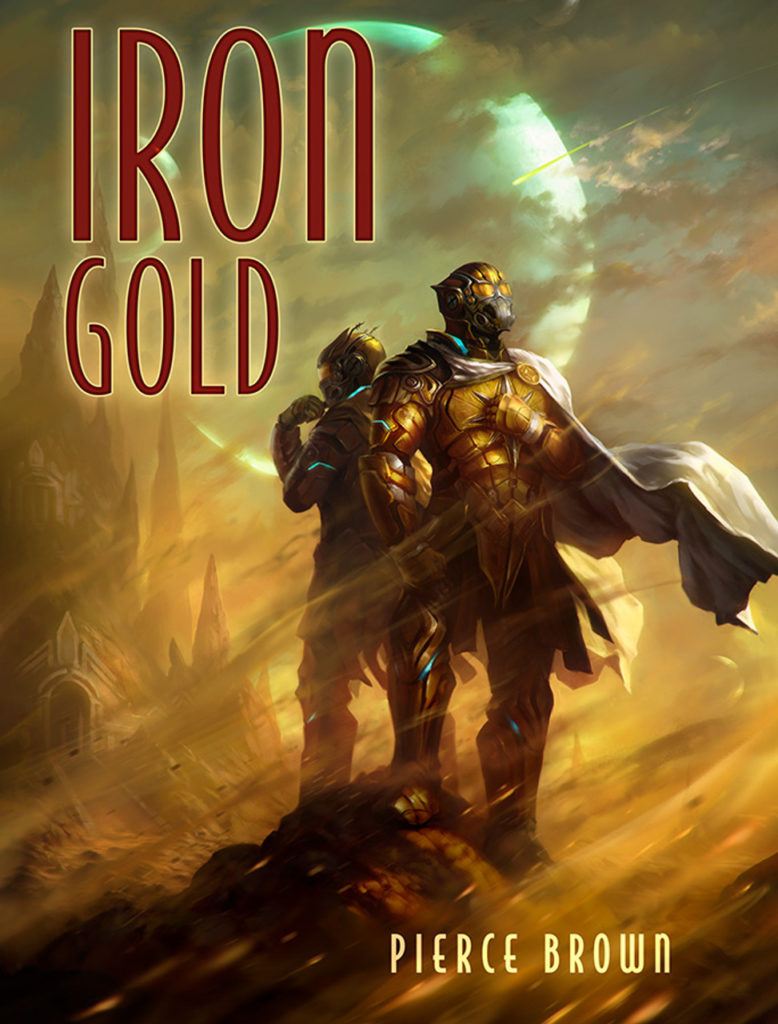Given that Pierce Brown’s Light Bringer recently hit stores, I started re-reading Iron Gold to see how it still holds up.
For those unfamiliar, Pierce Brown’s Red Rising series tells the story of a future dystopian world where human beings a sorted into a color-coded caste system (janitorial “browns,” security/police-keeping “grays”, manual laborer “reds”, etc., all ruled over by an elite case of “golds.”). A red named Darrow is chosen to undergo an experimental procedure to become a gold in order to take the fascist system down from the inside and liberate his people. If that sounds like it has the makings of a (cheesy) Ya series like Divergent, well, that’s because the series did, in fact, start that way. The first book involves Darrow participating in a series of harrowing trials against gold classmates at a training school highly reminiscent of something like the Hunger Games or [insert other YA dystopian novel series here]. But by now, Red Rising has grown far beyond its (let’s be honest, a little rough) YA dystopia-in-space opening novel to become something much, much grander.
Pierce Brown’s newest series of books set in the Red Rising universe (of which I have thus far only read the first two, Iron Gold and Dark Age), chart the course of a deadly war between the fascist gold society and the burgeoning new Solar Republic comprised of the various liberated factions, as well as some golds who have seen the error of their ways and now stand with Darrow.

Ever since Game of Thrones/A Song of Ice and Fire went off the rails (the former because the last season of the TV show was a disaster; the latter because George RR Martin never got around to finishing his books), I have seen a lot of news outlet print pieces claiming that X or Y fantasy series is the “next Game of Thrones.” I usually take all that with a grain of salt. But the Red Rising series (at least in its most recent installments) is that successor. In fact, it might even be better. All the intrigue is there. The fabled twists and turns. The shocking deaths. The complex, rich world-building.
The biggest difference, to my mind—and the reason I think Red Rising to be the better series–is that the story is more focused. A Song of Ice and Fire deals, in effect, with three different plot lines, spread far across the world: Daenerys and her dragons rampaging across slaver cities in the east, Jon Snow facing a potential zombie invasion in the far north, and (by far the most interesting sublot) the fight for control of the throne of Westeros. At least in the novels that have been published thus far, these plot lines only minimally intersect or have anything to do with one another, and the odds of them all ever joining and wrapping up into a satisfying conclusion is basically nil. In Iron Gold, however, the various plot lines are connected in more urgent, immediate ways. Even where the competing point-of-view protagonists don’t meet each other, their actions clearly have the potential to influence each other’s storylines in immediate, compelling ways. The other way in which Red Rising exceeds A Song of Ice and Fire is in the way it handles character deaths. While Martin still takes the cake for shocking character deaths, I find that he has a tendency, at times, to write himself into corners—removing key players before their time for the sake of shock value, thereby leaving himself without the ingredients to provide a satisfying resolution to his character arcs. There’s a reason Winds of Winter is never getting published. In Iron Gold and Dark Age, on the other hand, the deaths happen as they need to in order to further the overarching story.
Just as in Martin’s novels, Iron Gold and Dark Age deal with questions of power—who should have access to it and how it should be wielded. But the larger philosophical questions raised in Iron Gold and Dark Age feel a little more relevant in today’s world—how one can govern successfully in the wake of a revolution, and whether a fragile democracy composed of various self-interested, competing factions can long survive in the face of a unified, oppressive adversary.
The real question, of course, is whether Red Rising, unlike A Song of Ice and Fire or Game of Thrones, can stick the landing and cement itself as one of the best doorstopper, intrigue-and-war sci-f/fantasy series of all time. Reading back through Iron Gold, I’m delighted to see the novel holds up about as well as I remember. I suppose I can say that here—unlike with Martin’s novels—I remain cautiously optimistic that the series will stack the landing and give the world an ending that will tickle the brain, and touch (or break) the heart.